Research Library
The MATES Research Library is a central hub for publications, evidence and insights that inform, evaluate and strengthen our approach to suicide prevention and mental health across our industries.
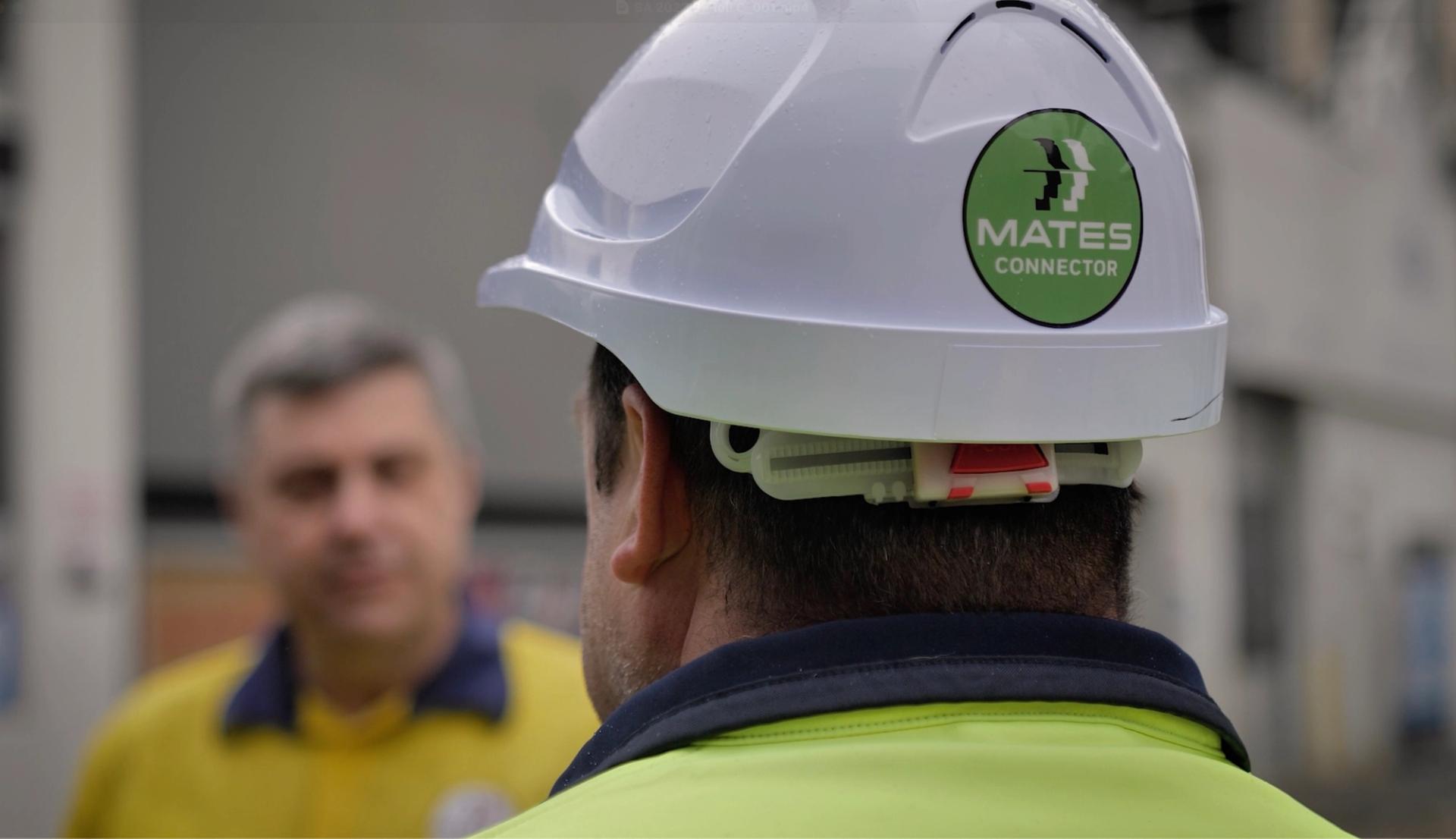
AUS

2022
Suicide in the Construction Industry: A Targeted Meta-analysis
Publisher:
Taylor & Francis Online
Authors:
S Tyler, H Hunkin, K Pusey, K Gunn, B Clifford, N Procter
Overview:
With research suggesting an increased risk of suicide for those employed in the construction industry the present review aimed to provide an updated, targeted, and rigorous estimate of the relative ri...
With research suggesting an increased risk of suicide for those employed in the construction industry the present review aimed to provide an updated, targeted, and rigorous estimate of the relative risk of suicide for this population. Access article: https://www.tandfonline.com/doi/full/10.1080/13811118.2022.2131488?scroll=top&needAccess=true
AUS
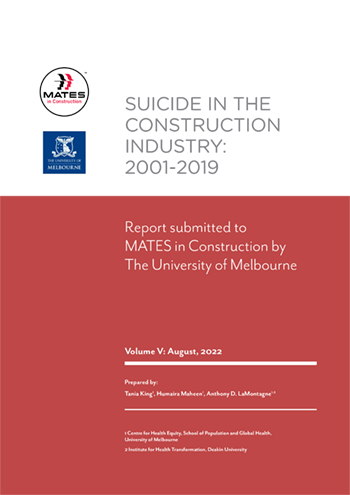
2022
Suicide in the Construction Industry: 2001-2019 Volume V: August, 2022
Publisher:
MATES in Construction
Authors:
H Maven, A LaMontagne, T King
Overview:
To inform its ongoing suicide prevention efforts, and to provide an evidence base for targeted workplace mental health literacy, MATES seeks to understand suicide trends among Australian construction ...
To inform its ongoing suicide prevention efforts, and to provide an evidence base for targeted workplace mental health literacy, MATES seeks to understand suicide trends among Australian construction workers. This report documents the updated examination of suicide mortality among Australian male construction workers relative to non-construction workers. We use the latest suicide mortality statistics obtained from the National Coronial Information Service to examine trends across the years between 2001 and 2019.
AUS
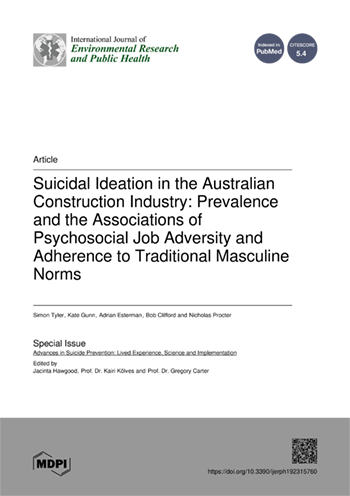
2022
Suicidal Ideation in the Australian Construction Industry: Prevalence and the Associations of Psychosocial Job Adversity and Adherence to Traditional Masculine Norms
Publisher:
International Journal of Environmental Research and Public Health
Authors:
S Tyler, K Gunn, A Esterman, B Clifford, N Procter
Overview:
Suicide in the Australian Construction Industry (ACI) is a significant issue, however minimal understanding of suicidal ideation prevalence, as well as the potential role psychosocial job adversity an...
Suicide in the Australian Construction Industry (ACI) is a significant issue, however minimal understanding of suicidal ideation prevalence, as well as the potential role psychosocial job adversity and increased adherence to traditional masculine norms may play in its presence, is apparent. A representative sample of Australian men were used to create initial understandings of prevalence of suicidal ideation, psychosocial job adversities and level of adherence to traditional masculine norms for the ACI in comparison to a general population comprised of the remaining employed males from Other Industries.
AUS
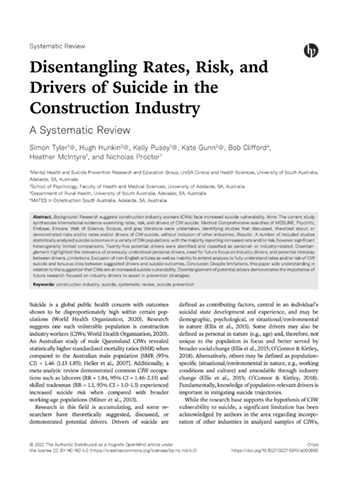
2022
Disentangling Rates, Risk, and Drivers of Suicide in the Construction Industry: A Systematic Review
Publisher:
American Psychological Association
Authors:
S Tyler, H Hunkin, K Pusey, K Gunn, B Clifford, H McIntyre, N Procter
Overview:
Research suggests construction industry workers (CIWs) face increased suicide vulnerability. The current study synthesizes international evidence examining rates, risk, and drivers of CIW suicide. Twe...
Research suggests construction industry workers (CIWs) face increased suicide vulnerability. The current study synthesizes international evidence examining rates, risk, and drivers of CIW suicide. Twenty-five potential drivers were identified and classified as personal- or industry-related. Disentanglement highlighted the relevance of previously understood personal drivers, need for future focus on industry drivers, and potential interplay between drivers.
AUS
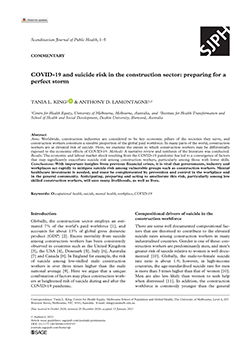
2021
COVID-19 and suicide risk in the construction sector: preparing for a perfect storm
Publisher:
Scandinavian Journal of Public Health
Authors:
T King, A LaMontagne
Overview:
In many parts of the world, construction workers are at elevated risk of suicide. Here, we examine the extent to which construction workers may be differentially exposed to the economic effects of COV...
In many parts of the world, construction workers are at elevated risk of suicide. Here, we examine the extent to which construction workers may be differentially exposed to the economic effects of COVID-19. LINK TO ARTICLE: https://doi.org/10.1177/1403494821993707
AUS

2021
Factors Associated With Workplace Bullying and the Mental Health of Construction Industry Apprentices: A Mixed Methods Study
Publisher:
Frontiers in Psychiatry
Authors:
V Ross, A Mathieu, R Wardhani, J Gullestrup, K Kolves
Overview:
This Australian study applied an exploratory sequential mixed methods design to explore issues faced by apprentices, estimate the prevalence of bullying and explore the factors associated with bullyin...
This Australian study applied an exploratory sequential mixed methods design to explore issues faced by apprentices, estimate the prevalence of bullying and explore the factors associated with bullying and the mental health of apprentices.
NZ
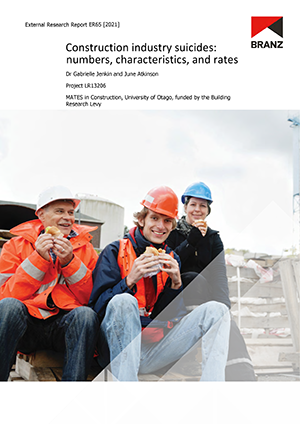
2021
Construction industry suicides: numbers, characteristics, and rates
Publisher:
BRANZ
Authors:
G Jenkins, J Atkinson
Overview:
The specific aims of this research were to re-examine the definition of the construction industry (and re-define if necessary), clarify the numbers of suicide in the New Zealand construction industry ...
The specific aims of this research were to re-examine the definition of the construction industry (and re-define if necessary), clarify the numbers of suicide in the New Zealand construction industry and calculate the industry specific suicide rate. Accurate suicide data for the industry is critical for monitoring suicide trends and providing a baseline for assessing the effectiveness of suicide prevention initiatives.
QLD / NT
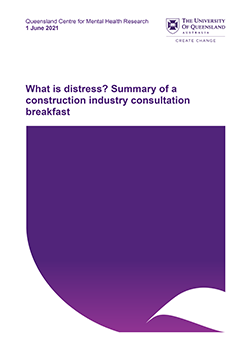
2021
What is distress? Summary of a construction industry consultation breakfast
Publisher:
The University of Queensland
Authors:
C Meurk and L Wittenhagen
Overview:
In June 2021, MATES in Construction Queensland hosted an industry consultation breakfast and workshop at which construction industry representatives came together to examine what ‘distress’ means to p...
In June 2021, MATES in Construction Queensland hosted an industry consultation breakfast and workshop at which construction industry representatives came together to examine what ‘distress’ means to people in the construction industry. This report summarises the key findings of this consultation process.
NZ
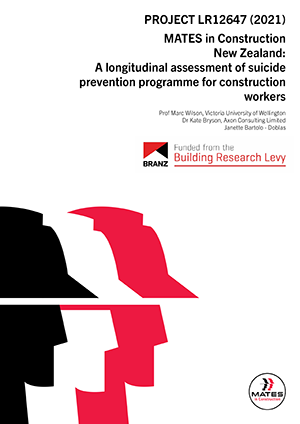
2021
MATES in Construction New Zealand: A longitudinal assessment of suicide prevention programme for construction workers
Publisher:
BRANZ
Authors:
M Wilson, K Bryson, J Bartolo
Overview:
This study is the first phase of an ongoing MATES evaluation programme in New Zealand. It evaluated the efficacy and impact of the General Awareness Training (GAT) on the workers’ attitudes towards su...
This study is the first phase of an ongoing MATES evaluation programme in New Zealand. It evaluated the efficacy and impact of the General Awareness Training (GAT) on the workers’ attitudes towards suicide, help-offering, and help-seeking. It also produced evidence and baseline data to measure impact and inform further development and refinement of the MATES programme in New Zealand.
AUS
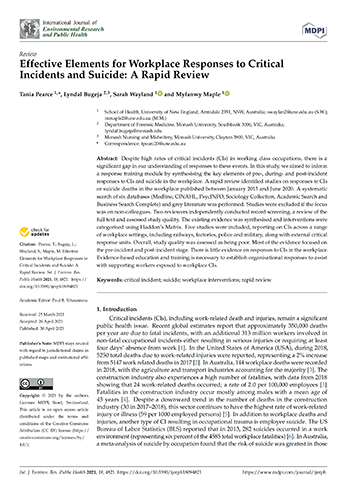
2021
Effective Elements for Workplace Responses to Critical Incidents and Suicide: A Rapid Review
Publisher:
International Journal of Environmental Research and Public Health
Authors:
T Pearce, L Bugeja, S Wayland, M Maple
Overview:
Despite high rates of critical incidents (CIs) in working class occupations, there is a significant gap in our understanding of responses to these events. In this study, we aimed to inform a response ...
Despite high rates of critical incidents (CIs) in working class occupations, there is a significant gap in our understanding of responses to these events. In this study, we aimed to inform a response training module by synthesising the key elements of pre-, during- and post-incident responses to CIs and suicide in the workplace.
